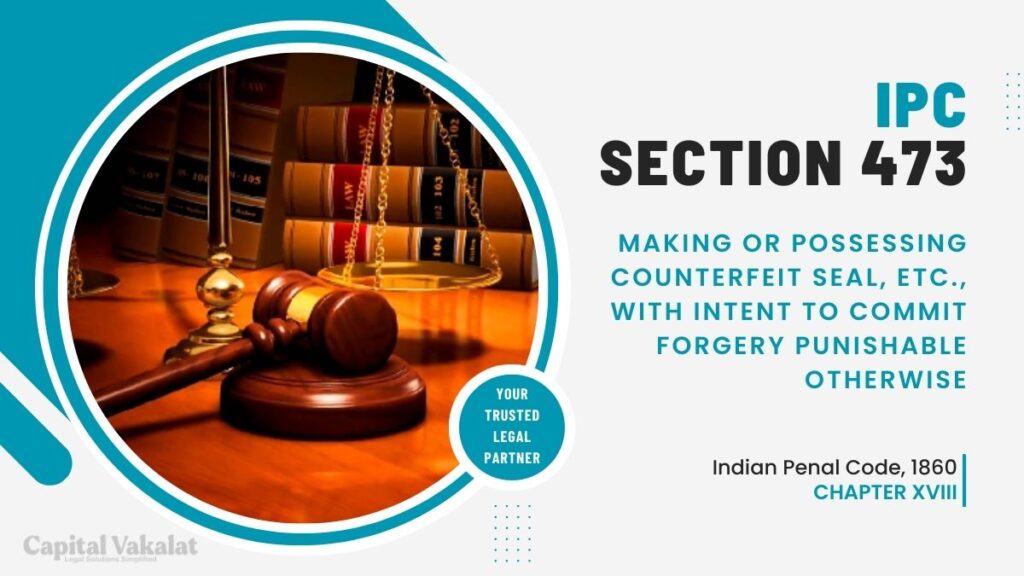Counterfeiting and forgery have long been criminal activities that threaten the integrity of legal and business transactions. In the Indian Penal Code (IPC), Section 473 specifically addresses the making or possessing of counterfeit seals with the intent to commit forgery. Understanding the nuances of this section is crucial in comprehending the legal consequences associated with such actions.

Forgery is a serious offense that undermines the trust and reliability of documents and transactions. Section 473 IPC aims to tackle a specific aspect of forgery – the creation or possession of counterfeit seals with the intent to commit forgery. This article delves into the intricacies of Section 473, shedding light on what constitutes a counterfeit seal, the legal ramifications, and its role in the broader context of forgery.
What Constitutes a Counterfeit Seal?
Before delving into the legal implications, it’s essential to understand what qualifies as a counterfeit seal. A counterfeit seal is a fabricated or altered representation of an official mark, emblem, or signature. This could include stamps, signatures, or any other mark used to validate documents. Differentiating between genuine and counterfeit seals is pivotal in determining the legitimacy of documents and preventing fraudulent activities.
Intent to Commit Forgery
Section 473 hinges on the concept of intent. Mere possession of a counterfeit seal may not suffice for prosecution; there must be evidence indicating an intention to commit forgery. Establishing this link is a crucial aspect of legal proceedings under this section, requiring a thorough examination of circumstances and motivations.
Punishments and Legal Ramifications
The penalties outlined in Section 473 IPC are stringent and reflect the severity of the offense. Individuals found guilty of making or possessing counterfeit seals with the intent to commit forgery can face significant legal consequences. To illustrate these consequences, real-life case studies will be examined, providing insight into the practical implications of the section.
The Role of Counterfeit Seals in Forgeries
Counterfeit seals play a pivotal role in various forgery cases. Examining real-life examples showcases how these forged marks are used in fraudulent activities, affecting individuals, businesses, and the legal system. Understanding the mechanics of these forgeries is essential for both legal professionals and the general public.
Challenges in Detecting Counterfeit Seals
Detecting counterfeit seals poses significant challenges due to advancements in technology and the increasing sophistication of forgers. This section will discuss the complexities involved in identifying counterfeit seals and explore how technological advancements can be both a boon and a bane in addressing these challenges.
Legal Precedents
Analyzing legal precedents related to Section 473 IPC provides valuable insights into the judicial interpretation of the section. Notable cases and their implications help in understanding how courts have approached and adjudicated cases involving the making or possessing of counterfeit seals with intent to commit forgery.
How to Protect Against the Misuse of Seals
Preventing the misuse of seals requires a proactive approach. This section will provide practical tips for individuals and organizations to safeguard their seals, along with an overview of legal measures that can be taken to prevent the creation and possession of counterfeit seals.
Recent Developments and Amendments
As the legal landscape evolves, it’s essential to stay abreast of any recent developments or amendments related to Section 473 IPC. This section will highlight any changes in the law, exploring their impact on the enforcement and prosecution of cases involving counterfeit seals.
Conclusion
In conclusion, Section 473 IPC serves as a crucial tool in combating the creation and possession of counterfeit seals with the intent to commit forgery. Understanding the legal nuances, challenges in detection, and the broader implications of this section is vital for legal professionals, law enforcement, and the general public alike. Combating counterfeiting forgeries is a collective effort that requires awareness, diligence, and a robust legal framework.
Frequently Asked Questions
How can individuals and businesses protect their seals from misuse?
Implementing secure storage measures, regular audits, and educating personnel on recognizing genuine seals are effective preventive measures.
Are there any recent amendments to Section 473 IPC?
Please refer to the latest legal publications or consult legal professionals for the most up-to-date information on amendments.
Can technological advancements aid in the detection of counterfeit seals?
Yes, advancements in technology can be both a challenge and a solution in detecting and preventing the misuse of counterfeit seals.
What is the typical punishment for offenses under Section 473 IPC?
Penalties vary, and the severity of punishment depends on factors such as the nature of the forgery and the intent behind possessing the counterfeit seal. Consult legal experts for specific cases.